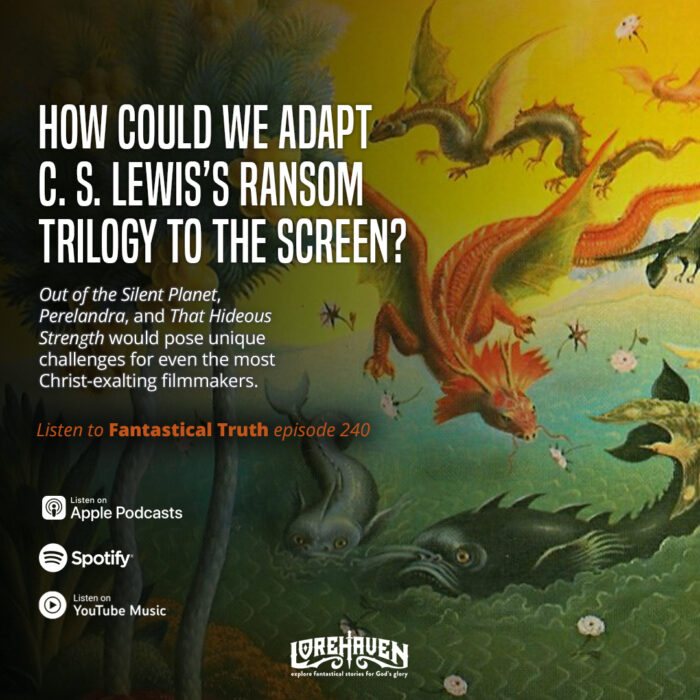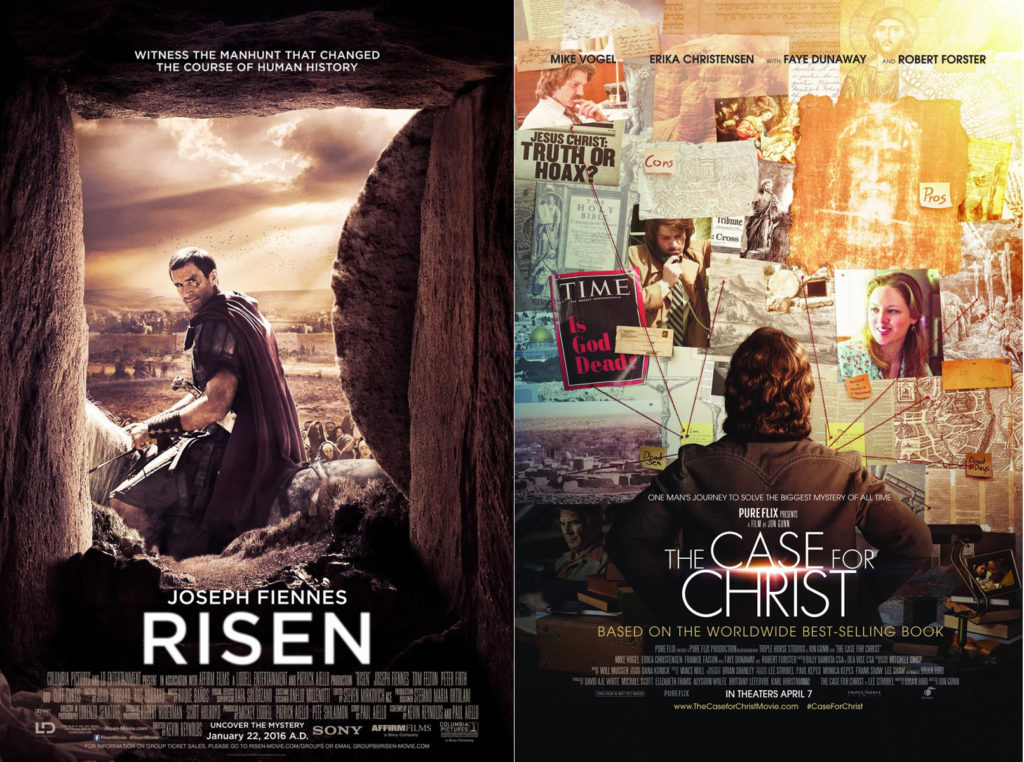Great Christian Movies About The Resurrection
Why do two great Christian movies both happen to focus on the resurrection of Jesus Christ?
Many Christians already know Christian movies tend to be shallow and even terrible. It’s why even Christian movie fans come prepared with reasons for seeing them anyway: “Well, we need to support movies like this.” “Well, we need to send a message to Hollywood.” “Well, it’s just a movie.” “Well, it’s really the message that’s best.”
Just once I’d like to see Christian movies that don’t require us to act like women at the “well,” if you catch my drift.
These films vex many Christians due to poor acting and simplistic themes, but they’re also vexing because of the overwhelming praise and support they receive from our Christian friends and neighbors. Even those of us who dislike art snobbery find such praise disproportionate.
I have tried to like such films, and perhaps they have a place. But why must Christian fans stop at those kinds of stories and proclaim them our best? Biblical Christianity calls us to explore creatively deeper stories that cross cultures and, even at the popular level, show God’s truths and beauties onscreen — including themes that go beyond conversion stories, “miracle” accounts, and American social issues.1
But within the past year, we’ve received at least two great Christian movies. I’ve seen the first, and not yet seen the second, but its reviews are stunningly positive, even from skeptics. And both films focus on Jesus’s resurrection.
Last year, Risen brought the story of a fictional Roman centurion named Clavius. In this biblical drama, Clavius supervises part of Jesus’s crucifixion and then the burial of Jesus Christ. Which of course means he has his hands full when the body disappears and Pontius Pilate gets on his case, to get on the case of the century.
Risen isn’t like usual biblical dramas that cast biblical heroes as central characters. It works better because it’s about one fictional man, Clavius (Joseph Fiennes), and his reaction to biblical historical events.
Before any of the “Bible story” parts begin, we see Clavius leading Roman soldiers against a troop of wild revolutionaries. He quietly, easily dispatches a zealot with a familiar name. But Clavius isn’t cruel. He’s a dutiful, professional officer of the law. When he shares with someone that he wants power and ambition, he’s only saying that. Like a good “noble pagan,” he reveals he’s a true believer in at least one false god, and longs for a day beyond war when he can salvage a quiet countryside and live the rest of his short life in peace.
To describe this, I’m necessarily reduced to using words. Don’t misunderstand. Risen fulfills one of the basics of better cinematic stories that many Christian films don’t: what you see tells the story just as much, if not more, than what you hear. We don’t just hear about them but we see biblical images fleshed out — such as Clavius clad in blood and filth versus the clean washing of water, and the constant images of death’s decay versus the offer of eternal life and peace.2
Fast-forward from the 30s via 2016 to the 1980s via 2017. Another Christian movie is stacking up what are, for Christian movies, rave reviews — The Case for Christ. (This is the one I haven’t seen yet, but will soon.)
This film adapts the popular nonfiction book by Lee Strobel into a historical drama about his life, and eventual conversion to Christianity. Reviews from Christian movie skeptics, and secular reviewers, universally praise the film’s respect for its characters (Christians and atheists and in-between) and even its respect for the time period.
In other words, it turns out that if Christian movies believably show “earthly” things, even hardcore critics might “believe” when you also tell them heavenly things.3
So far, The Case for Christ won over a majority of critics who have reviewed it, according to the (hit and miss) aggregate review site Rotten Tomatoes.
Here’s gentle-snark Christian YouTuber, and part-time Christian movie reviewer, Kevin McCreary:
Just got home from seeing A Case for Christ. It’s a freak’n solid film. Good job @PureFlix !
— Kevin McCreary (@goodnightkev) April 8, 2017
At Forbes, Luke Thompson concludes:
While there’s obvious triumph for conservative viewers in the tale of a member of the “liberal media” coming over to their side, the film doesn’t bash journalists in the same way that The Resurrection of Gavin Stone felt the need to make all of Hollywood look bad in its actor-conversion story. There are no out-and-out villains in this film; just plenty of people with flaws. And it’s with sympathy for all of them, perhaps, that Jon Gunn makes his best case for Christianity, even for folks not completely sold on Christ Himself.
The Hollywood Reporter‘s Frank Sheck is more mixed, but doesn’t hate it. He does, however, make sure to follow secular Christian-movie-review stylebook and work the phrase “[please] the faithful” into the review:
The Case for Christ won’t garner many new converts, especially since the evidence presented, at least in the film, proves sketchy at best. But it will certainly please the faithful, and proves more engrossing than most films of its ilk.4
And my Christ and Pop Culture/Christianity Today colleague Kevin McLenithan notes:
Every writer encounters a certain maxim at some point while learning his or her craft: “Show, don’t tell.” The underlying principle is that a story is always stronger when it can make its audience feel something rather than simply instructing them how to feel. It’s no surprise, then, that The Case for Christ is strongest when it remains content to thoughtfully explore Strobel’s story. When it sets exploration to the side and wields that story like a sermon anecdote, the failure of imagination infects the filmmaking.
I hope that The Case for Christ’s successes, rather than its flaws, will nonetheless serve as a model for future faith-based films. In its climactic conversion scene, Lee Strobel attempts to pray, but stumbles over his inexperience: “God, I don’t know what I’m doing,” he laughs. That moment—honest, plain, and shot through with joy and humility—serves the film’s purposes better than all of its Bible experts combined. That’s what we really came to see.
What is it, apparently, about Jesus’s resurrection that helps these great Christian movies?
Maybe it’s because his resurrection reminds us that Jesus is not distant-spirit, but God-and-Man, forever.
Maybe it’s because Jesus as a forever God-and-Man validates God’s approval of his material universe.
Maybe it’s because, when we value the material world, our stories necessarily do the same. And that way our stories do not view the material world as just a shell, or pretty wrapping for the real significant content of spiritual lessons. That way, our stories better tell us earthly things, so we can better believe heavenly things.
- E. Stephen Burnett, ‘Risen’ Reflects the Subversive Power of the Resurrection, Christ and Pop Culture, Feb. 23, 2016. ↩
- Ibid. ↩
- I borrowed this line from my Left Behind (2014) movie review. Even better, when Christian movies do get good reviews, the makers don’t need to tell their fans deceptive “earthly things,” such as that the critics only despise the movie because it’s Christian. ↩
- My editorial hatred for the phrase “the faithful” is growing more diabolical. ↩








































